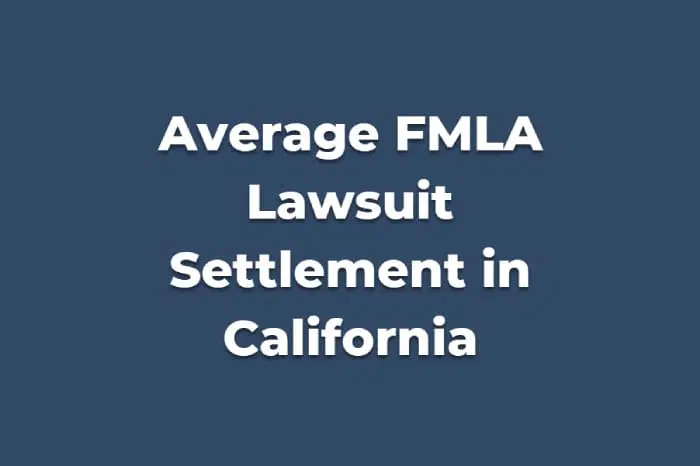
Average FMLA Lawsuit Settlement in California (2024 Update)
Legally reviewed by: Jessica Anvar Stotz, JD, MBA
According to Guardian Life and ESIS, the average FMLA lawsuit settlement in California and the rest of the US is roughly $80,000. In more severe cases, settlements can surpass $500,00 and even $1,000,000.
Average FMLA Lawsuit Settlement Amounts in California
| Severity of FMLA Violation | Settlement Amount |
| Minor | Approximately: $10,000 – $50,000 |
| Moderate | Approximately: $80,000 – $300,000 |
| High | Approximately: $300,000 – $1,000,000+ |
Example California FMLA Lawsuits
- Amazon worker in Bakersfield sues over firing after his parents died
- Spirit class action alleges airline prevents employees from using FMLA benefits
- Settlement near for LAPD officer who says request for leave led to graveyard shift assignment
Factors that Affect FMLA Lawsuit Settlement Amounts
When it comes to Family and Medical Leave Act (FMLA) lawsuits in California, several factors can influence the potential settlement amounts. Here are some key factors that can affect FMLA lawsuit settlement amounts in California:
- Severity of FMLA Violations: The more egregious the FMLA violations by the employer, such as blatantly denying leave or retaliating against the employee for taking leave, the higher the potential settlement amount.
- Lost Wages and Benefits: Employees may be entitled to recover lost wages, benefits, and other compensation if they were wrongfully terminated or disciplined for taking FMLA leave. The amount of lost income and benefits can significantly impact the settlement value.
- Emotional Distress and Pain and Suffering: In cases involving severe emotional distress or mental anguish caused by the FMLA violations, compensatory damages for pain and suffering can substantially increase the settlement amount.
- Punitive Damages: If the employer’s conduct is found to be particularly egregious or malicious, punitive damages may be awarded, which can significantly increase the settlement value.
- Reinstatement or Front Pay: If the employee was wrongfully terminated, they may seek reinstatement to their former position or front pay (compensating for future lost wages) as part of the settlement.
- Employer’s Financial Resources: The employer’s financial resources and ability to pay a substantial settlement can influence the settlement amount. Large corporations may be more inclined to settle for higher amounts to avoid negative publicity or costly litigation.
- Strength of Evidence: The strength of the evidence and documentation supporting the FMLA violations, such as written policies, emails, or witness testimony, can impact the settlement negotiations.
- Attorney’s Fees and Costs: Successful FMLA lawsuits may entitle the employee to recover attorney’s fees and legal costs, which can be factored into the settlement amount.
- Applicable Laws and Precedents: The interpretation of FMLA laws by courts in California, as well as relevant precedents from previous cases, can influence the potential settlement range.
*It’s important to note that FMLA lawsuit settlements in California can vary significantly depending on the specific circumstances of each case. An experienced employment law attorney can provide a more accurate assessment of the potential settlement value based on the unique factors involved.
Types of Compensation You May Be Able to Receive
In an FMLA (Family and Medical Leave Act) lawsuit, an employee may be able to receive various types of compensation, depending on the specific circumstances of the case and the damages suffered. Here are some common types of compensation that an employee could receive in an FMLA lawsuit:
- Back Pay: This refers to the wages, salaries, and benefits that the employee would have earned if they had not been wrongfully denied FMLA leave or terminated for taking FMLA leave.
- Front Pay: If reinstatement to the employee’s former position is not feasible or appropriate, the employee may receive front pay, which compensates for future lost wages and benefits.
- Compensatory Damages: These damages are awarded to compensate the employee for any actual monetary losses, such as out-of-pocket expenses related to the FMLA violation (e.g., medical bills, job search expenses).
- Emotional Distress Damages: Employees may receive compensation for emotional distress, mental anguish, or pain and suffering caused by the FMLA violation.
- Punitive Damages: In cases where the employer’s conduct is found to be particularly egregious or malicious, punitive damages may be awarded to punish the employer and deter similar behavior in the future.
- Reinstatement: In some cases, the employee may be reinstated to their former position, with the same benefits, seniority, and status they would have had if the FMLA violation had not occurred.
- Liquidated Damages: Under the FMLA, employees may be entitled to liquidated damages, which are equal to the amount of back pay and other monetary losses, unless the employer can prove that the violation was in good faith.
- Attorney’s Fees and Costs: Successful FMLA plaintiffs may recover reasonable attorney’s fees and legal costs associated with pursuing the lawsuit.
- Interest: Interest may be awarded on any back pay or other monetary damages awarded to the employee, calculated from the date the violation occurred.
*It’s important to note that the specific types of compensation and their amounts will depend on the facts of the case, the extent of the FMLA violations, and the applicable laws and precedents in the jurisdiction where the lawsuit is filed.
How to Prove You Have a Valid FMLA Lawsuit
To prove you have a valid FMLA (Family and Medical Leave Act) lawsuit, you generally need to establish the following elements:
- Eligibility: You must demonstrate that you were an eligible employee under the FMLA. This typically means you worked for a covered employer (one with 50 or more employees within a 75-mile radius) and had been employed for at least 12 months, working a minimum of 1,250 hours during that time.
- Qualifying Reason: You must show that you needed to take leave for a qualifying reason under the FMLA, such as your own serious health condition, caring for a family member with a serious health condition, caring for a newborn or newly adopted child, or a qualifying exigency related to a family member’s military service.
- Notice and Request: You should provide evidence that you provided proper notice to your employer of your need for FMLA leave, following the employer’s policies and procedures.
- Employer Violation: You must demonstrate that your employer violated your rights under the FMLA. This can include denying your request for FMLA leave, retaliating against you for taking FMLA leave (such as termination, demotion, or other adverse actions), or failing to reinstate you to the same or an equivalent position upon your return from leave.
Evidence to Prove Your Case
To prove your case, you may need to provide various forms of evidence, including but not limited to:
- Employment records: Documents showing your length of employment, hours worked, and eligibility for FMLA leave.
- Medical documentation: Relevant medical records or certifications from healthcare providers supporting your need for FMLA leave.
- Communication records: Emails, letters, or other communications with your employer regarding your request for FMLA leave and any responses or actions taken by the employer.
- Witness testimony: Statements from co-workers, supervisors, or others who may have knowledge of the FMLA violation or your employer’s actions.
- Company policies: Your employer’s FMLA policies and procedures, as well as any deviations from those policies.
- Documentation of adverse actions: Evidence of termination, demotion, disciplinary actions, or other adverse employment actions taken against you in relation to your FMLA leave.
*It’s important to consult with an experienced employment law attorney who can evaluate your specific situation, advise you on the strength of your case, and guide you through the process of gathering necessary evidence and filing a valid FMLA lawsuit.
How to Know You May Not Have a Valid FMLA Lawsuit
Someone may not have a valid FMLA (Family and Medical Leave Act) lawsuit if any of the following situations apply:
- Ineligibility: If the employee does not meet the eligibility requirements under the FMLA, such as working for a covered employer (with 50 or more employees within a 75-mile radius) or having worked for the employer for at least 12 months and 1,250 hours during that time.
- Non-qualifying Reason: If the employee took leave for a reason that does not qualify under the FMLA, such as a personal vacation, non-serious illness, or other non-covered circumstances.
- Proper Notice Not Given: If the employee failed to provide proper notice to the employer of their need for FMLA leave, following the employer’s policies and procedures for requesting leave.
- Employer Compliance: If the employer fully complied with the FMLA requirements, such as granting the requested leave, maintaining the employee’s benefits during leave, and reinstating the employee to the same or an equivalent position upon their return.
- Legitimate Business Reasons: If the employer had legitimate, non-discriminatory business reasons for any adverse actions taken against the employee, such as poor performance or misconduct unrelated to the FMLA leave.
- Statute of Limitations: If the employee fails to file a lawsuit within the applicable statute of limitations, which is generally two years from the date of the alleged FMLA violation (or three years if the violation was willful).
- Lack of Damages: If the employee cannot demonstrate any actual damages resulting from the alleged FMLA violation, such as lost wages, benefits, or emotional distress.
- Failure to Exhaust Administrative Remedies: In some cases, the employee may be required to first file a complaint with the appropriate administrative agency (e.g., the U.S. Department of Labor) before pursuing a lawsuit.
- Technical Deficiencies: If the employee fails to meet certain technical or procedural requirements for filing an FMLA lawsuit, such as proper service of the complaint or adherence to court rules.
It’s crucial to consult with an experienced employment law attorney who can evaluate the specific circumstances of your situation and advise you on whether you have a valid FMLA claim. They can help identify potential weaknesses or defenses that may undermine your case and provide guidance on the best course of action.
Benefits of Hiring an Attorney
Hiring an attorney for an FMLA settlement can provide significant benefits. An experienced employment law attorney can evaluate the strength of your case, ensure you meet all legal requirements, and negotiate aggressively to secure a fair settlement.
They understand the complexities of FMLA laws and can protect your rights throughout the process. An attorney can leverage their expertise to maximize the compensation you receive, including lost wages, emotional distress damages, and attorney’s fees.
Additionally, having legal representation often prompts employers to take the claim more seriously and negotiate in good faith. With an attorney’s guidance, you can navigate the settlement process confidently and increase your chances of achieving a favorable outcome.
Connect with a Lawyer
Looking to see if you have a valid hostile work environment case? Contact LawLinq to connect with some of the best employment attorneys in the state. All initial consultations are free.


